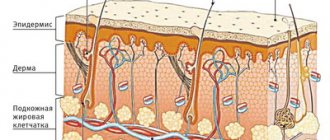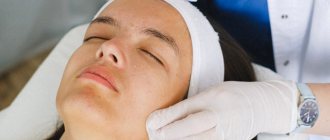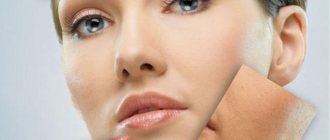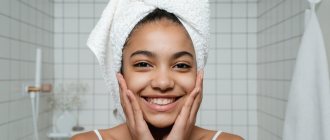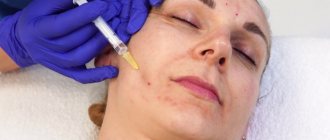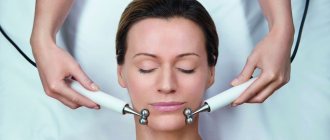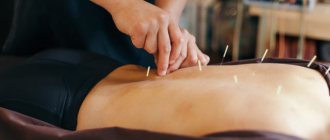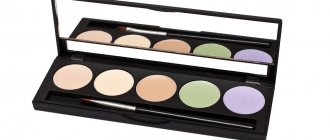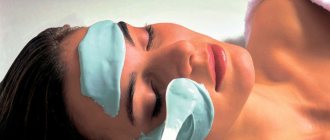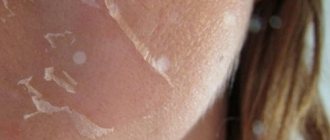Why do rashes appear?
Point inflammation on the face occurs due to excessive work of the sebaceous glands and hyperkeratosis - the presence of keratinized scales on the surface of the skin.
Insufficient or poor-quality cleansing, using products that are not suitable for your skin type, frequent touching your face - all this provokes the development of inflammation. As a result, acne appears on the skin. Healthy skin functions like a precise mechanism. Pores are not clogged, sebum easily comes to the surface and creates a natural protective layer for the skin. If the pores are clogged, if they contain small particles of dirt, cosmetics, “heavy” oils, skin breathing is impaired. The situation is aggravated, as mentioned above, by the presence of unexfoliated cells on the surface of the face. These factors provoke the appearance of acne.
The right skin care routine for daily use at home can solve the problem of breakouts if there is no deeper cause. But often the skin reacts with rashes, acne and redness to foods that are not suitable for you personally, alcohol, changes in hormonal levels, and the presence of a number of diseases. That is why the doctor cannot limit himself to drawing up a home care plan.
Advantages
Smart medicine for smart people
Safe, effective and natural rejuvenation
The best technologies for communicating with patients
We don't just take care of your beauty - we recharge you!
ACNE IN ADULTS: WHY AND HOW TO TREAT
Experts:
Elena Andreeva , Doctor of Medical Sciences, Professor, Head of the Department of Gynecological Endocrinology and Reproduction of the Endocrinological Center of the Russian Medical Technologies
Elena Demina , Candidate of Medical Sciences, gastroenterologist
Tamara Korchevaya , Candidate of Medical Sciences, dermatologist, director of the Danaya Center for Medical Cosmetology
According to some reports, every fifth woman aged 25–50 suffers from acne. Some blame it on a lack of sexual activity, others on improper skin care in youth, others on the skin demodex mite, and still others think that acne haunts those with a sweet tooth...
Today scientists are sure: none of the listed factors is to blame. The causes of acne are primarily internal, and there are three main ones:
– hormonal imbalance;
– disruption of the gastrointestinal tract (GIT);
– chronic inflammation of the nasopharynx.
Hence the main rule: if you have acne, go not to a beauty salon, but to a multidisciplinary clinic or a serious dermatological center, where dermatologists, gynecologists, endocrinologists, gastroenterologists work together and special attention is paid to laboratory tests. Only in this case can you count on a positive, lasting result.
REASON #1: HORMONES
CLASSIFICATION OF THE PROBLEM
Acne usually begins with blackheads (open comedones). Contrary to popular belief, this is not dirt at all, but a mixture of sebum and dead cells that have clogged the pores. Closed comedones appear as whiteheads or nodules and have a white head.
Red pimples (papules) occur when acne becomes inflamed.
If a pimple becomes infected, it can turn into a pustule.
The most serious damage is a cyst. It is located against a background of inflammation and looks red or purple-bluish. Do not try to deal with it yourself - scars may remain in place of the cysts. Even one cyst is a reason to consult a dermatologist.
In most cases, they are the ones to blame. “The most common cause of adult acne is an excess of male hormones, in particular testosterone ,” says Professor Elena Andreeva. When this hormone in the female body becomes more than required, the sebaceous glands begin to function hyperactively, and acne appears.
The matter is further complicated by the fact that other systems also fail at the same time. “Often the occurrence of acne can be accompanied by menstrual irregularities and even hirsutism (excessive hair growth),” continues our expert. – If elevated testosterone levels are not detected in time, it can cause infertility and the development of polycystic ovary syndrome. Sometimes acne signals a disease of the pituitary gland and adrenal glands.”
Therefore, the first step for acne is a consultation with a gynecologist-endocrinologist and a full examination. You will have to donate blood for sex hormones and thyroid hormones, as well as do a biochemical and clinical blood test, a general urine test, an ultrasound of the ovaries, uterus and thyroid gland.
IMPORTANT DETAIL. Some hormones are very capricious - their levels in the blood fluctuate depending on the time of day and day of the menstrual cycle. For the analysis to be reliable, it must be taken on the 5th–7th day of the cycle between 8 and 9 am.
REASON #2: STOMACH AND INTESTINES
The second most common cause of acne is problems with the gastrointestinal tract. Acne is often accompanied by dysbiosis, or intestinal dysbiosis , and it, in turn, can be caused by gastritis, cholecystitis, and peptic ulcers. A gastroenterologist will help you find out what’s wrong in your case.
“First of all, the doctor will write out a referral for a microbiological examination of stool and analysis for helminths, protozoa, and lamblia,” says gastroenterologist Elena Demina. “Sometimes an ultrasound of the gallbladder with an assessment of contractile function, ultrasound of the liver and pancreas is required to clarify the picture.”
Having received the results of the examinations, the doctor can prescribe antibiotics, choleretic agents, as well as pro- and prebiotics, that is, special drugs that help restore beneficial intestinal microflora. Some of them must be taken strictly on an hourly basis and according to a certain schedule. Even a failure on one day can negate all treatment and the acne will return.
During the course you will have to take tests several times to make sure there is a result. “Health” wrote more about dysbiosis in the last issue.
REASON #3: TONSILS
Few people associate frequent sore throats and constant inflammation on the face. And yet there is a connection, and a very direct one. In 30–40% of cases, people with acne often have or are suffering from sore throats and, as a result, have chronic tonsillitis. “And this is a constant purulent focus of inflammation,” explains dermatologist Tamara Korchevaya. “The tonsils become a springboard for the proliferation of staphylococcus, streptococcus and other bacteria.”
In addition, the functioning of the lymphatic system largely depends on the condition of our tonsils. If the tonsils are unhealthy, the lymphatic system malfunctions, and toxins are less easily eliminated from the body. As a result, the functioning of the sebaceous glands is disrupted, inflammation occurs and acne appears.
That's why dermatologists say: if you want to get rid of acne, cure your throat . A visit to the ENT specialist is required. Treatment boils down to taking antibacterial drugs and washing the tonsils. If tonsillitis is very advanced, the doctor may recommend removing the tonsils - sometimes this can radically solve the problem.
SHOOTING AT TARGETS
3 PROHIBITIONS FOR ACNE
1. Never squeeze out blackheads yourself . You will only push the contents even deeper, causing an infection that leads to the formation of a cyst.
2. Do not use soaps, tonics or lotions with a high alcohol content. They dry out and irritate the skin, the sebaceous glands begin to work even more actively, and acne only gets worse.
3. Do not go for cosmetic procedures if you have inflammation on your face. This risks spreading the infection. Not a single competent cosmetologist will take care of you when there are untreated inflammations on your face.
So, the internal cause of acne has been identified and treatment has been prescribed. Only now the dermatologist begins to work with the skin, acting directly on inflammation. Antibacterial creams and ointments are usually prescribed initially. If they do not produce an effect within 1–2 weeks, heavy artillery is used.
* And antibiotics of the tetracycline and macrolide groups, as well as those based on cotrimoxazole, inhibit the growth of bacteria and relieve inflammation. Be prepared to take them for a long time - from 1 to 4 months. You may need to alternate between different medications to prevent bacteria from developing resistance to them. Antibiotics have side effects: tetracycline, for example, reduces the effectiveness of some contraceptives. Be sure to discuss this issue with your doctor. Moreover, you will have to meet regularly: throughout the entire course you need constant monitoring by a specialist and regular blood tests in order to adjust the treatment if necessary.
* Another group of medications is combined oral contraceptives , such as Jess, Yarina, Diane-35. All of them are officially registered for the treatment of acne, as they reduce the activity of the sebaceous glands, reducing testosterone levels. Such contraceptives must be selected strictly individually. Sometimes, after completing the course, acne returns - in this case, you need to look for another regimen with your doctor, but under no circumstances self-medicate.
* Preparations based on vitamin A - retinoids - made a real revolution in dermatology 30 years ago. Such ointments and creams effectively clear clogged pores and prevent the appearance of new acne. Sometimes they are prescribed in combination with antibiotics.
* The last resort is retinoids with isotretinoin , another vitamin A derivative, taken orally. These remedies are often prescribed when the main treatment is over, but the face remains uneven. Under the influence of retinoids, the sebaceous glands are reduced, and the skin is evened out. Unfortunately, if the factors that provoke excessive activity of the sebaceous glands remain, after a few months the acne will return again.
CAREFULLY! Retinoids are very toxic and should only be prescribed by a doctor. Dry skin is far from the worst side effect. Headaches, joint pain, and liver problems caused by excess vitamin A are also possible. Isotretinoin increases the skin's sensitivity to ultraviolet radiation. After a course of retinoids, you cannot do cosmetic surgery, photo- and electrolysis, or laser procedures for another year. In addition, doctors advise planning a pregnancy no earlier than three months after completing the course.
FOOD FOR SKIN
TWO MAIN MYTHS
Acne is due to lack of sex. This is partly true for juvenile acne: when a teenager becomes sexually active, hormonal levels often normalize and acne disappears. But in adult women, the appearance of acne has nothing to do with the quantity and quality of sex.
Pimples - from excess chocolate. This myth has been debunked by several studies. Doctors fed one group of volunteers a chocolate substitute, and the other group - dark chocolate with 85% cocoa. No relationship between skin condition and chocolate consumption was observed.
There is no special diet against acne. But all world experts agree: for treatment to be successful, it is important to change your lifestyle and diet to healthier ones.
Don't overeat at night. When we sleep, our enzymes do not work to break down food, but to remove waste products. If we distract them from this important mission, the skin is the first to suffer.
Drink at least 1.5–2 liters of water and green tea per day. The more fluid, the better the removal of toxins from the body.
Try to avoid foods that stimulate the sebaceous glands : alcohol, coffee, fatty and smoked foods. It is also advisable not to overindulge in sweets: sugar enhances fermentation processes in the intestines, and this does not have the best effect on the skin.
Be careful with milk. According to some reports, it can provoke acne - more precisely, not the milk itself, but the hormones it contains that were given to cows. There is no strong evidence for this hypothesis, but dermatologists advise drinking only organic milk or replacing it with fermented milk products. Moreover, the latter are extremely beneficial for the intestinal microflora.
Pay special attention to foods high in fiber and zinc . Fiber normalizes intestinal function, and zinc regulates the functioning of the sebaceous glands. Include more fruits and vegetables in your diet, don't forget about fish, red meat, legumes and nuts.
And move more! Sports, long walks in the fresh air, any active movement triggers detoxification processes.
ELIMINATION OF CONSEQUENCES
It is not enough to relieve inflammation on the skin - it is important to smooth out the consequences of old ones (the so-called post-acne), and prevent unsightly scars and spots from forming in the place of cured acne. It used to be that scars were inevitable, but recently there have been ways to minimize them.
One of the new directions in the treatment of post-acne is mesotherapy with homeopathic medicines . “When used in a timely manner, such drugs give a very effective result – softer scarring of the skin,” says Tamara Korchevaya. With already formed scars, homeopathy, alas, will not help.
But they can be reduced by dermabrasion and peelings. Practicing esthetician Elena Grechukhina considers multifunctional devices , which include dermabrasion, vacuum massage and non-injection mesotherapy, to be the most effective. After a course of such procedures, the skin condition noticeably improves: vacuum massage allows you to practically erase acne spots, and non-invasive administration of medications improves the appearance of the skin.
photopneumatic therapy has received great interest , recommended for the treatment of acne by the American Food and Drug Administration (FDA). This is an improved photothermolysis method that combines laser and vacuum effects. The vacuum drains the contents of the sebaceous glands and provides them with a kind of massage. After just 8–9 procedures, the spots on the face become noticeably lighter.
Conclusions "Health"
1. Acne is a reason to go not to a cosmetologist, but to a doctor. Only on the basis of a serious examination can the true cause of acne be identified. Treatment should be combined: you should be treated simultaneously by a dermatologist and doctors of related specialties.
2. Today they know how to treat acne. This process is effective, but lengthy, requiring certain costs and self-discipline. And no amateur work: only a professional can deal with acne.
3. Modern cosmetological methods successfully combat the consequences of acne. But you need to start cosmetic procedures last, when the main acne treatment has already been prescribed and is in full swing.
STRESS IS BLAMED
Dermatologists have long suspected that stress can cause acne. A study by American scientists from Wake Forest University proved this. For several months, they observed students suffering from acne of varying degrees of severity. It turned out that during periods of high emotional stress (for example, before exams), the frequency of acne increased by 23%. Other studies have confirmed that stress triggers inflammation and also slows down the healing of acne.
Scientists advise: if you have treated problems with the gastrointestinal tract and hormones, but acne does not go away, consult a psychologist. Perhaps he is the one who can help you.
OPINION: Elena Svechnikova, dermatologist, lecturer at the Department of Skin and Venereal Diseases of the Russian State Medical University
ROSACEA: THE MITE IS NOT TO BLAME
A separate group is occupied by rosacea, or rosacea. This chronic disease is one of the most mysterious in dermatology. It is associated with increased sensitivity of blood vessels on the face: acne can be triggered by sun rays, hot tea, alcohol, spicy food... Some doctors believe that genetic predisposition is to blame: fair-skinned northerners with blond or red hair and blue eyes are most susceptible to rosacea.
For many years it was believed that the disease was caused by a microscopic demodex mite that lives on the skin. However, in recent years this theory has been debunked. Demodex is recognized as an opportunistic microorganism; it cannot by itself cause rosacea. There is no need to treat demodicosis for rosacea.
Published: February 16, 2021
"Adult" acne
If an adult experiences rashes on the skin of the face, he should understand that the causes may be:
- regular stress leading to disruption of the endocrine system;
- any other factors that provoke hormonal imbalance (including, for example, pregnancy);
- taking medications: for example, acne can appear while taking hormonal oral contraceptives, antidepressants, corticosteroids, etc.
- diseases of the liver, kidneys, gall bladder;
- irritable bowel syndrome;
- excessive sunbathing, use of inappropriate sunscreens;
- overdrying of the skin with alcohol-containing care products;
- use of cosmetics with comedogenic oils (these are substances that clog pores on the skin).
Acne is experienced by sweet lovers, people with lactose intolerance, gluten intolerance, patients who abuse alcohol, and men and women who smoke. And in each case, the approach to healing the skin and giving it a beautiful look will be different!
MIGUNOVA ANASTASIA ANDREEVNA
Cosmetologist
Initial consultation: RUB 4,500
Make an appointment with a doctor Instagram
VYATKINA IRINA SERGEEVNA
Gynecologist-endocrinologist
Initial consultation: RUB 8,500
Make an appointment with a doctor Instagram
KALININA EKATERINA ALEXANDROVNA
Cosmetologist
Initial consultation: RUB 4,500
Make an appointment with a doctor Instagram
KOZLOVA EKATERINA NIKOLAEVNA
Gynecologist-endocrinologist, oncologist
Initial consultation: RUB 5,000
Make an appointment with a doctor Instagram
PMS pimples
Sharp rashes on the face before menstruation do not depend on the general state of health and can appear in the life of every woman. Their occurrence is associated with hormonal processes occurring at this moment in the body. Usually these are a couple of pimples, which soon, with proper care, disappear without a trace. What you definitely shouldn’t do is squeeze, burn, or otherwise try to get rid of acne. Talk to your esthetician about how to properly care for your skin before your period begins.
Allergic reactions
A rash may appear due to an allergic reaction to components contained in skin care products and decorative cosmetics. In this case, the basis of treatment will be the exclusion of allergens from daily care. An allergic reaction can also occur due to exposure to ultraviolet rays - the so-called “sun allergy”. The solution to the problem will be to select with a cosmetologist suitable means of protection against UV radiation, for example, mineral-based. Marina Ryabus's clinic offers sun protection products from the brands Skinceuticals and Colorescience.
Causes of acne on the chin
Factors influencing the appearance of red spots and purulent rashes in the lower part of the face can be of a different nature. Pimples on the chin can also be different - there can be many or few of them, they can be small or large, etc. Most often they appear as a result of:
- unhealthy diet, alcohol abuse and smoking;
- disorders associated with climate change in the body;
- reduction of barrier functions;
- infectious diseases;
- small pimples on the chin are a sign of an allergic reaction to cosmetics or perioral dermatitis;
- failure to comply with personal hygiene rules;
- improper skin care;
- genetic predisposition;
- pathologies and diseases of the gastrointestinal tract;
- ovarian dysfunction.
You can identify the exact cause of acne on the chin by taking and subsequent testing. This will help identify the real source of the problem.
A laboratory examination is prescribed by a dermatologist (or cosmetologist) if there are appropriate indications.
It should be remembered that any skin rashes are a sign of disorders in the body, so it is very important to promptly identify the cause of the development of the disease and apply appropriate measures to eliminate them.
Photodermatosis
We have already mentioned it above. This is a pathological reaction of the skin to ultraviolet radiation. You can encounter photodermatosis not only on vacation in a southern country, but also while in your hometown. Moreover, it can occur at any age. Especially when taking photosensitizing drugs or hormonal therapy. Most often, patients with a genetic predisposition encounter photodermatosis.
Reviews
Tatiana
I am happy to be among your guests at the clinic, I enjoy our communication, I am grateful for your super professionalism, for giving beauty and a sense of confidence in your professional actions, protection from “age-related changes”
